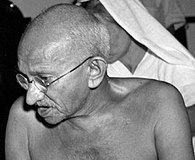File:Gandhi and Nehru in 1946.jpg

Original file (1,200 × 1,276 pixels, file size: 168 KB, MIME type: image/jpeg)
Captions
Captions
Summary[edit]
| DescriptionGandhi and Nehru in 1946.jpg |
English: Gandhi with Rashtrapati Jawaharlal Nehru, during a meeting of the All India Congress, Bombay, India More information about this photograph in John Hlavacek, United Press Invades India: Memoirs of a Foreign Correspondent, 1944-1952, 2011, pp. 47-48 |
||
| Date | |||
| Source | http://img27.fansshare.com/pic105/w/timeline-of-indian-history/1200/26947_timeline_of_indian_history.jpg | ||
| Author |
Credited to Dave Davis, Acme Newspictures Inc., correspondent [1] Photo taken by Max Desfor, who gave it to Dave Davis [2] [3] |
||
| Permission (Reusing this file) |
https://www.loc.gov/rr/print/res/220_acme.html | ||
| Other versions |
|
Licensing[edit]
| Public domainPublic domainfalsefalse |
This work is in the public domain in the United States because it was published in the United States between 1929 and 1977, inclusive, without a copyright notice. For further explanation, see Commons:Hirtle chart as well as a detailed definition of "publication" for public art. Note that it may still be copyrighted in jurisdictions that do not apply the rule of the shorter term for US works (depending on the date of the author's death), such as Canada (50 p.m.a.), Mainland China (50 p.m.a., not Hong Kong or Macao), Germany (70 p.m.a.), Mexico (100 p.m.a.), Switzerland (70 p.m.a.), and other countries with individual treaties.
العربية ∙ беларуская (тарашкевіца) ∙ čeština ∙ Deutsch ∙ Ελληνικά ∙ English ∙ español ∙ français ∙ Bahasa Indonesia ∙ italiano ∙ 日本語 ∙ 한국어 ∙ македонски ∙ Nederlands ∙ português ∙ русский ∙ sicilianu ∙ slovenščina ∙ ไทย ∙ Tiếng Việt ∙ 中文(简体) ∙ 中文(繁體) ∙ +/− |
| Public domainPublic domainfalsefalse |
This work is in the public domain in India because its term of copyright has expired.
The Indian Copyright Act applies in India to works first published in India. According to the Indian Copyright Act, 1957, as amended up to Act No. 27 of 2012 (Chapter V, Section 25):
العربيَّة | বাংলা | Deutsch | English | français | हिन्दी | italiano | 日本語 | ಕನ್ನಡ | македонски | മലയാളം | मराठी | Nederlands | português do Brasil | sicilianu | தமிழ் | ತುಳು | اردو | 繁體中文 | +/− |
 |
| Annotations InfoField | This image is annotated: View the annotations at Commons |
File history
Click on a date/time to view the file as it appeared at that time.
| Date/Time | Thumbnail | Dimensions | User | Comment | |
|---|---|---|---|---|---|
| current | 14:50, 30 October 2014 |  | 1,200 × 1,276 (168 KB) | The Herald (talk | contribs) | Higher resolution |
| 20:38, 12 December 2006 |  | 900 × 957 (136 KB) | Yann (talk | contribs) | Pandit Nehru and Mahatma Gandhi during the All-India Congress Committee session, August 8, 1942, when the "Quit India" resolution was adopted, calling for the immediate dissolution of British rule. The following morning, British authorities arrested Gandh |
You cannot overwrite this file.
File usage on Commons
The following 5 pages use this file:
File usage on other wikis
The following other wikis use this file:
- Usage on am.wikipedia.org
- Usage on ar.wikipedia.org
- Usage on arz.wikipedia.org
- Usage on as.wikipedia.org
- Usage on az.wikipedia.org
- Usage on bn.wikipedia.org
- Usage on cs.wikipedia.org
- Usage on de.wikipedia.org
- Usage on el.wikipedia.org
- Usage on en.wikipedia.org
- Usage on eo.wikipedia.org
- Usage on fa.wikipedia.org
- Usage on he.wikipedia.org
- Usage on hr.wikipedia.org
- Usage on hu.wikipedia.org
- Usage on hy.wikipedia.org
- Usage on it.wikipedia.org
- Usage on ja.wikipedia.org
- Usage on kn.wikipedia.org
- Usage on ko.wikipedia.org
- Usage on la.wikipedia.org
- Usage on ml.wikipedia.org
- Usage on mn.wikipedia.org
- Usage on mr.wikipedia.org
- Usage on nl.wikipedia.org
- Usage on nn.wikipedia.org
- Usage on or.wikipedia.org
- Usage on pl.wikipedia.org
View more global usage of this file.
Metadata
This file contains additional information such as Exif metadata which may have been added by the digital camera, scanner, or software program used to create or digitize it. If the file has been modified from its original state, some details such as the timestamp may not fully reflect those of the original file. The timestamp is only as accurate as the clock in the camera, and it may be completely wrong.
| JPEG file comment | CREATOR: gd-jpeg v1.0 (using IJG JPEG v80), quality = 80 |
|---|


